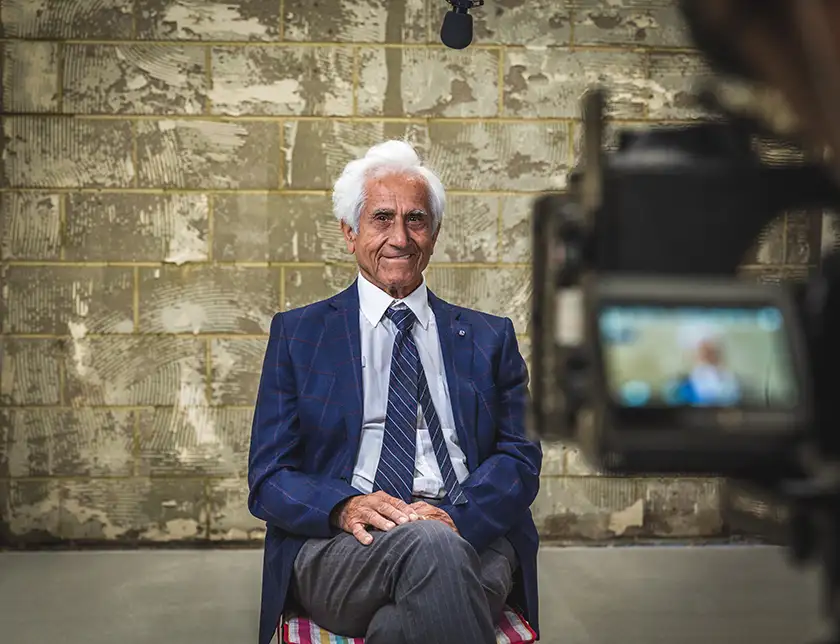The Divided Island repeats the same generic history of Cyprus that created the conditions to forget about its now fifty-year-old partition.
Director: Cey Sesiguzel
Producer: Andreas Tokkallos
Genre: Documentary
Run Time: 90′
Cert: TBC
U.K. Release: November 1, 2024
U.S. Release: TBA
Where to Watch: In UK cinemas
Something is rotten in the Eastern Mediterranean. A decades-long conflict continues to split this former British colonial possession along ethnic lines. History has long forgotten how it started and there’s no end in sight. Regional players are fearful the conflict will escalate. One side claims a thousands-year-long ethnic ownership of this land; the other has a several-hundred-years claim. I am of course talking about Cyprus, which this year mourned fifty years of partition, and the raison d’être of The Divided Island.
Directed by Turkish Cypriot Cey Sesiguzel, and co-produced by Greek Cypriot Andreas Tokkallos, The Divided Island claims to portray a nuanced, unbiased take on a historical event ignored for decades. Unlike after the partition of Palestine, or Ireland, or Korea, or India, Cyprus has remained relatively peaceful since its division in 1974, with little to gain by either side in the socio-political big picture. This is the first problem with portraying the country and its partition: why is this necessary to remember today? It’s easy to see the generic comparison to Palestine, but not with what we see on social media today.
The second issue with The Divided Island is similar to the main problem with bio-pics today. Too much involvement from both sides creates an environment where nobody is really the victim; errors made by the principal characters are admitted to yet used as acts of forgiveness, and everyone is equally appeased. But this documentary goes one step further by creating a never-ending environment of both sidesism by having the film crew be both Greek and Turkish Cypriots, as well as the interview subjects. The content is forced to take a centrist approach to facts that removes the necessary gradients of blame and villainy.
In form, it takes the standard documentary playbook approach: talking head interviews of historians and people who experienced the 1974 partition, old black and white footage of all that happened before 1974, music swelling to dramatic heights to tell you when to feel certain emotions, and a general disinterested, playing it safe, de-stylized approach.

The third problem with The Divided Island is that it simply repeats the same, tired ‘both sides are at fault’ narrative that hasn’t helped reconcile the Cyprus conflict for half a century. As the story goes, both Greeks and Turks stoked fears about the other before, and especially after, Cyprus gained independence in 1960, which soon led to sectarian violence. And while the filmmakers frame the historical events in a way for the Cypriots to actually come together and be responsible for their destiny, it fails to account for the ‘how’ and ‘why’ of the reasons bigger powers (Greece, Turkey, Britain, and the USA) had used and abused them.
What is disappointing about The Divided Island is that it’s positioning itself as starting a necessary discussion during an important historic milestone in the history of Cyprus, but goes on to tell a Wikipedia summarizing of the events. Here’s how it goes: Cyprus was passed around by regional powers for millenia, most notably by the Ottomans until 1878, who traded it to the British. After stoking ethnic conflicts between Greek and Turkish Cypriots, the British gave independence to Cyprus in 1960. Conflicts between the two sides grew quickly, which is exacerbated by a fascist Greek militia group. Then a decade later, the Greek junta invaded, which triggered a Turkish counter-invasion. Then the island was officially split.
Some vitally important things The Divided Island bizarrely avoids: the 1960 agreement denied Cypriots much of their democratic rights in favor the appeasing the Turkish minority, the Turkish government is almost entirely unmentioned, the USA (which shouldered responsibility in 1964 from Britain) and Kissinger (who approved of the Greek invasion) are never brought up, and the important months of July and August, 1974, are joined together to avoid the awkward need to take sides when discussing this history. In July, both Greek and Turkish troops invaded Cyprus. The Greek junta almost immediately fell apart in Cyprus afterwards, which even led to its fall in mainland Greece months later.
While the first Turkish invasion was a direct counter-reaction to the Greek invasion, their second invasion a month later, which The Divided Island muddled its way through besides from a heart-breaking anecdotal interview, was riddled with heinous, unnecessary war crimes. This included the expulsion of all Greek Cypriots from the northern areas (that were re-populated by colonizers), the sacking and destruction of all Greek cultural sites and symbols, the unfortunately common traumatization of civilians, and illegal annexation of northern Cyprus into a separatist Turkish state, as it remains today.
At the same time, the US government, which had supported the Greek junta until the Greek people decided they wanted democracy, switched support to an increasingly militarized contingent in the Turkish government, which led to their own coup in 1980 by the same generals who got their start in Cyprus. Again, The Divided Island fails to mention this necessary context for understandable yet not entirely forgivable reasons.
Christopher Hitchens, who married a Greek Cypriot in 1981, wrote his first book about Cyprus. As he may have argued about the content of The Divided Island had he seen it, he wrote that “all these consoling explanations make it easier for those responsible to excuse themselves and for the rest of the world to forget about Cyprus. But such a loss of memory would be unpardonable.” He went on lamenting that forgetting this history would set a dangerous precedent on invading other countries, larger powers altering geography and demography, and “overlooking the aspiration of a European people to make a passage from colonial rule to sovereignty in one generation.” Unfortunately, much of The Divided Island uses “consoling explanations” to repeat the both sides approach to Cyprus in both form and content; not to mention the failed lessons of allowing larger powers the ability to play mapmakers.
The Divided Island will be released in UK cinemas from November 1, 2024.

